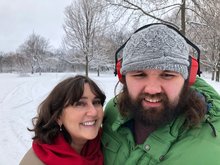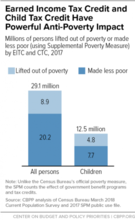Found 84 resources.
0
0
0
Education Design Lab taps four large community colleges in an ambitious effort to raise single-mother completion rate 30 percent at each institution by 2024.
Topics: Dual-generation, Early childhood, Family engagement, Low-income, Metrics, Post-secondary
0
0
0

Founded in 1995 as Project Women, Family Scholar House (FSH) provides comprehensive, holistic services for disadvantaged single parents, their children, and foster alumni. The nonprofit seeks to end the cycle of poverty and transform communities by empowering families and youth to succeed in education and life-long self-sufficiency. FSH provides supportive housing, educational programming, and participant advocacy to help families gain independence.
Topics: Dual-generation, Early childhood, Education, Homelessness, Housing, Low-income, Partnerships, Place-based, Post-secondary, South, Stability
0
0
0
With 22 percent of the undergraduate student population comprised of parents, policymakers and institutions must explore the unique needs of this population and address the challenges that may prevent parents from attaining their degree. This includes determining what systems, services, and approaches best support their mental health needs. This brief examines opportunities for policymakers and academic institutions to adapt existing mental health services in order to meet the unique needs of students who are parents and help them complete their degree.
Topics: Dual-generation, Early childhood, Mental health, Post-secondary
0
0
0
Investments in the postsecondary success of parents with young children can increase attainment of credentials leading to good jobs, bring children the benefits of high-quality learning environments, promote later college-going among children, and improve family economic security across generations. This factsheet provides figures on the student parent population based on the latest National Postsecondary Student Aid Study data.
Topics: Dual-generation, Early childhood, Post-secondary, Research, Youth
0
0
0

Managing director of Ascend at the Aspen Institute discusses the role of women in public health policy-making
Topics: Dual-generation, Early childhood, Family engagement, Mental health, Pre-natal, Research
0
0
0
Resources from Ascend at The Aspen Institute
Topics: Asset building, Child welfare, Dual-generation, Early childhood, Family engagement, Research, Youth
0
0
0
Federal safety net programs are intended to protect the most vulnerable Americans—such as the elderly, people with severe disabilities and young children. Housing assistance plays a critical role in the safety net, providing decent, safe, and affordable housing for millions of extremely low-income and vulnerable families—though, because it is not an entitlement like other federal safety net programs, the assistance available falls far short of the need. Housing subsidies free families to spend on other essentials like healthy food, education, and health care.
Topics: Asset building, Dual-generation, Education, Housing, Mental health, Mobility, Partnerships, Research, Workforce development
 Shared by Housing Is
on Apr 2, 2019
Shared by Housing Is
on Apr 2, 2019 0
0
0
Released bi-monthly, each issue of the ZERO TO THREE Journal focuses on a critical topic within the early childhood development field. Journal articles are carefully composed to present current knowledge, latest research, and practical advice to help early childhood professionals do their best work in support of infants and toddlers.
Topics: Child welfare, Dual-generation, Early childhood, Homelessness, Housing, Low-income, Research, Safety
0
0
0
Democrats this week announced new legislation that would slash child poverty by paying low-income parents the kind of monthly allowance that is standard in other developed countries. But the lawmakers who introduced the bill, called the American Family Act, didn’t use the terms “child benefit” or “child allowance” at their Capitol Hill press conference Wednesday. Instead, they all called it a tax credit or a tax cut.
Topics: Child welfare, Dual-generation, Early childhood, Funding, Legislation & Policy, Low-income, Research
 Shared by Housing Is
on Mar 12, 2019
Shared by Housing Is
on Mar 12, 2019 0
0
0
The strengths and abilities children develop from infancy through adolescence are crucial for their physical, emotional, and cognitive growth, which in turn help them to achieve success in school and to become responsible, economically self-sufficient, and healthy adults. Capable, responsible, and healthy adults are clearly the foundation of a well-functioning and prosperous society, yet America’s future is not as secure as it could be because millions of American children live in families with incomes below the poverty line. A wealth of evidence suggests that a lack of adequate economic...
Topics: Child welfare, Dual-generation, Legislation & Policy, Low-income, Research
 Shared by Housing Is
on Mar 1, 2019
Shared by Housing Is
on Mar 1, 2019 0
0
0
In the summer of 2018, Ascend gathered more than two dozen state and national policy experts and other leaders in the fields of health and early learning at its Aspen Meadows Campus in Aspen, Colorado, to discuss the growing opportunity to leverage the 2Gen approach at the state level and determine how best to take promising new innovations to scale. This report offers a snapshot of specific things federal, state, and local leaders can keep doing, start doing, or stop doing to remove barriers and accelerate success.
Topics: Dual-generation, Early childhood, Family engagement, Legislation & Policy, Research
 Shared by Housing Is
on Feb 15, 2019
Shared by Housing Is
on Feb 15, 2019 0
0
0
During CLPHA’s Education Working Group Webinar on addressing school attendance at PHAs, representatives from the King County Housing Authority and the national nonprofit Attendance Works presented on tools for addressing chronic absenteeism, as well as strategies for fostering a culture of attendance among residents.
Topics: Attendance, CLPHA, Dual-generation, Education, Housing, Housing Is Working Group, Low-income, Metrics, Partnerships, Place-based
 Shared by Housing Is
on Feb 12, 2019
Shared by Housing Is
on Feb 12, 2019 0
0
0

For a very young child, the relationship with a primary caregiver, most often though not exclusively a mother, lays an important psychological foundation for later flourishing. Successful attachment and bonding in the first two years of life predicts healthy later development on a range of fronts, from mental health to educational skills. When bonding and attachment prove difficult, child development is affected. Recent advances in brain science allow this impact to be shown more clearly and more definitively.
Topics: Child welfare, Depression, Dual-generation, Early childhood, Health, Low-income, Mental health, Mobility
0
0
0
Times are changing rapidly for families—our households, work and the workforce do not look like they did just a decade ago. Challenges and barriers for parents continue to grow – skyrocketing costs of health care and child care, lack of flexibility at the workplace, and less time at home. Working parents have to balance their budget and time across an ever-changing landscape of needs: from caring for themselves, their children, and older family members, to affording quality child care and paying household bills. Removing barriers so families can care for their loved ones requires us to...
Topics: Child welfare, Dual-generation, Early childhood, Family engagement, Health, Legislation & Policy, Low-income, Preventative care
0
0
0
A Summary of Results from the MIHOPE and MIHOPE-STRONG Start Studies of Evidence-Based Home Visiting
A healthy birth and positive experiences in early childhood can promote health and development. One approach that has improved outcomes for children and their parents is home visiting, which provides individually tailored support, resources, and information to expectant parents and families with young children. This brief summarizes recently published reports from two national studies of evidence-based early childhood home visiting: the Mother and Infant Home Visiting Program Evaluation (MIHOPE) and MIHOPE-Strong Start.
Topics: Child welfare, Dual-generation, Early childhood, Home visiting, Metrics, Partnerships, Place-based, Preventative care, Research
0
0
0

Housing complex would integrate residents with special needs into the larger community
Topics: Disabilities, Dual-generation, Housing, Mental health, Place-based, Safety
 Shared by Housing Is
on Jan 31, 2019
Shared by Housing Is
on Jan 31, 2019 0
0
0

A D.C. housing development serves as a refuge for grandparents raising young children. Is it a model for the rest of the country?
Topics: Child welfare, Dual-generation, East Coast, Family engagement, Low-income, Place-based, Seniors, Stability, Youth
0
0
0

This SchoolHouse Connection series is focused on helping youth experiencing homelessness succeed in college. We highlight best practices for supporting these students from institutions across the country. These are living documents that will be updated regularly to provide new and innovative practices.
Topics: Dual-generation, Education, Homelessness, Housing, Low-income, Post-secondary, Youth
0
0
0
According to the Institute for Women’s Policy Research, 26% of undergraduate students--about 4.8 million students--are raising dependent children. Students of color are more likely to be parents; additionally, about 70% of parenting students are women. These students are balancing many competing demands: attending classes, keeping up with schoolwork, and caring for children. College and child care are costly, with the average cost of child care ranging between $8,000-$35,000 each year. As a result, parenting students are more likely to experience food and housing insecurity than students who...
Topics: Dual-generation, Early childhood, Education, Housing, Partnerships, Post-secondary, Youth
0
0
0

The Earned Income Tax Credit (EITC) and Child Tax Credit (CTC) together boosted the incomes of 29.1 million Americans in 2017, lifting 8.9 million above the poverty line and making 20.2 million others less poor, our analysis of new Census data shows.
Topics: Asset building, Dual-generation, Legislation & Policy, Low-income, Research
0
0
0

Island School is one of 247 “community schools” in New York. These are regular public schools, with a twist. They have longer days and longer school years: Island stays open 12 hours a day, six days a week, including spring and winter breaks as well as the summer. A psychologist makes weekly rounds. A dentist comes by regularly. So does an optometrist, and students who need glasses get them free.
Topics: Community development, Dual-generation, East Coast, Education, Family engagement, Homelessness, Housing, Low-income, Mental health, Metrics, Partnerships, Stability, Youth
0
0
0
Stricter work requirement policies for the Supplemental Nutrition Assistance Program (SNAP) at the federal level were left out of the recently passed farm bill, but state policymakers are still considering whether to expand or establish their own work requirements for SNAP and Medicaid, with the goal of incentivizing employment. There’s no question that good jobs help spur upward mobility. But if we are serious about helping people work, we have to get serious about helping people improve their skills.
Topics: Child welfare, Cost effectiveness, Dual-generation, Early childhood, Food insecurity, Legislation & Policy, Low-income, Research, Stability, Workforce development
0
0
0
Using a two-generation (2Gen) framework, Medicaid can be designed to support the social capital, health and well-being, educational attainment, and economic security of children and families, together, so they can maximize their health and thrive. This checklist outlines specific Medicaid policies and design choices adopted in Colorado to implement a 2Gen approach to improve the lives of children and families.
Topics: Dual-generation, Early childhood, Family engagement, Health, Low-income, Medicaid / Medicare
0
0
0
Shining a light on supportive approaches to noncustodial parenting, specifically by looking at Colorado’s successful CO-PEP program.
Topics: Dual-generation, Early childhood, Family engagement, Partnerships
0
0
0
The Colorado Division of Youth Services is working to transform the family experience by taking a two-generation (2Gen) approach to the services it provides.
Topics: Child welfare, Dual-generation, Early childhood, Family engagement, Low-income, Partnerships, Stability
